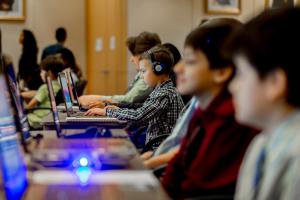ECNU Review of Education Study Proposes Spatiotemporal Framework for Educational Transformation
A new study offers fresh perspective on how education systems can adapt to the challenges and opportunities of artificial intelligence (AI)
SHANGHAI, CHINA, April 30, 2025 /EINPresswire.com/ -- In an era marked by rapid technological advancements, the traditional education system, with its rigid curriculum and prescribed learning paths, is increasingly seen as inadequate for preparing students to embrace the complexities of the modern world. Researchers have identified the tension between prescribed curriculum and student autonomy as the core issue of the educational system. This study analyzes how changes to the prescribed curriculum, pedagogy, and assessments can enhance student autonomy and learning.In an age dominated by the rise of technology and AI, the current education system is beset by several challenges, including the lack of student autonomy and an extremely rigid and time-consuming schooling system. The more students are compelled to follow a prescribed curriculum, the less freedom they have to personalize their learning. Improvements in schooling have thus become a major area of interest as policymakers, practitioners, and researchers have been working hard to tweak, enhance, and optimize the mechanisms of the current education system.
In response to these challenges, a new study by Yong Zhao from the University of Kansas and Ruojun Zhong from YEE Education provides a detailed framework for transforming education by rethinking the traditional constraints of time and space in learning. This study was made available online on February 11, 2025, in ECNU Review of Education.
According to the researchers, the current schooling and education system suffers from rigidity in curriculum and four other key elements within the school-based system, namely pedagogy, evaluation and assessment, activities, and environment. Through their analysis, the authors hoped to identify concrete strategies to balance the prescribed curriculum with learners’ control over learning. The study also provides a detailed analysis of the schooling system from spatiotemporal perspectives along with a uniquely fresh perspective on the changes and improvements required to weather the challenges of AI and enhance student learning.
The study introduces the concept of “Time Available for Autonomy” (TAFA) as a key indicator of student control over their learning experiences. It highlights how prescribed curricula, pedagogical practices, learning activities, environments, and assessments often restrict students’ ability to explore, create, and develop their unique interests and strengths. The authors advocate for a more flexible and student-centered approach that allows learners to take charge of their educational journeys.
Zhong and Zhao note, “The current education system, with its emphasis on standardized curricula and assessments, leaves little room for students to pursue their passions and develop essential skills like creativity and critical thinking. By adopting a spatiotemporal lens, we can identify new ways to expand students’ autonomy and prepare them for the uncertainties of the AI-driven future.”
The study proposes several innovative strategies for transforming education, including reducing scheduled time by limiting the amount of time dedicated to prescribed curricula, thereby creating more opportunities for students to engage in self-directed learning and pursue their interests. It also calls for transforming pedagogy by shifting the role of teachers from mere content deliverers to facilitators and mentors who support student-driven projects and inquiry-based learning.
Additionally, the study suggests rethinking learning environments through the use of AI and other technologies to create global, borderless learning spaces that extend beyond the physical classroom and empower students to learn from diverse perspectives. The article stresses that schools and teachers must reassess how AI and other technologies fit into students’ learning experiences. Despite significant investments in modernizing classrooms with technology, there has been limited improvement in educational outcomes. This stagnation may stem from an outdated view of teaching and learning that fails to harness technology’s full potential.
Finally, it advocates for personalizing assessments by moving away from standardized tests to more holistic and personalized evaluation methods that capture individual growth, strengths, and potential. Zhong and Zhao emphasize that these changes must be implemented systemically, recognizing the interconnectedness of various educational elements. They argue that by extending students’ TAFA, education systems can foster greater creativity, resilience, and adaptability—qualities essential for thriving in the age of AI.
In conclusion, the study calls for a collective effort from policymakers, educators, and stakeholders to embrace a new paradigm of education that prioritizes student autonomy and personalization. "The future of education lies in our ability to adapt and innovate," say Zhong and Zhao. Adding further, they claim, “By rethinking the traditional constraints of time and space, we can create learning experiences that empower every student to reach their full potential.”
***
Reference
Title of original paper: Education Paradigm Shifts in the Age of AI: A Spatiotemporal Analysis of Learning
Journal: ECNU Review of Education
DOI: 10.1177/20965311251315204
Melody Zhang
ECNU Review of Education
+86 21 6222 4545
roe|ecnu.edu.cn| |roe|ecnu.edu.cn
Visit us on social media:
X
Legal Disclaimer:
EIN Presswire provides this news content "as is" without warranty of any kind. We do not accept any responsibility or liability for the accuracy, content, images, videos, licenses, completeness, legality, or reliability of the information contained in this article. If you have any complaints or copyright issues related to this article, kindly contact the author above.
Global Tech Titans Join Forces with Indonesia’s Top CIOs for digitalCIO 2025
CallMyDoctor.ae Launches 24/7 Pediatrician at Home Service in Dubai for Immediate Child Care
Magsstore Eliminates Shipping Costs for Print Magazine Subscriptions Nationwide
Kalendarium
Więcej ważnych informacji
 Jedynka Newserii
Jedynka Newserii

 Jedynka Newserii
Jedynka Newserii

Farmacja

Zagrożenie krztuścem pozostaje najwyższe od ponad trzech dekad. Odporność utrzymuje się do 10 lat po szczepieniu
W ubiegłym roku na krztusiec zachorowało ponad 32 tys. osób. To ok. 35 razy więcej niż rok wcześniej. Ostatnie tygodnie przynoszą wyhamowanie tendencji wzrostowej, ale Główny Inspektor Sanitarny przestrzega przed tą groźną chorobą i wskazuje na konieczność szczepień u dzieci już w okresie niemowlęcym i szczepień przypominających u dorosłych. Dużą rolę w promowaniu tej jedynej formy profilaktyki odgrywają pielęgniarki, które nie tylko informują o korzyściach ze szczepień, ale też mogą do nich kwalifikować.
Bankowość
Zdaniem 80 proc. Polaków ceny nieruchomości są wysokie lub bardzo wysokie. Mimo to i tak wolimy posiadać na własność, niż wynajmować

Tylko 26 proc. Polaków uważa, że mamy obecnie dobry moment na zakup nieruchomości. Dla ośmiu na 10 ankietowanych ceny nieruchomości są obecnie wysokie lub bardzo wysokie. 65 proc. ocenia też, że niewiele osób z ich otoczenia może sobie teraz pozwolić na zakup mieszkania lub domu – wynika z badania „To my. Polacy o nieruchomościach” portalu ogłoszeniowego Nieruchomosci-online.pl.
Transport
Nowe opłaty za emisję CO2 mogą spowodować wzrost kosztów wielu małych i średnich firm. Eksperci apelują o mądre instrumenty wsparcia [DEPESZA]

System ETS2, który zacznie obowiązywać od 2027 roku, nałoży podatek na paliwa kopalne wykorzystywane do ogrzewania budynków czy w transporcie. Koszty w dużej mierze poniosą dostawcy, w tym małe i średnie firmy. – Potencjalny wpływ systemu ETS2 na sektor MŚP w Polsce będzie znacznie mniej drastyczny, niż mogłoby się wydawać. Konieczne jest jednak przygotowanie odpowiednich instrumentów, które wesprą przedsiębiorców w przemianie w kierunku niskoemisyjnym, ale jednocześnie będą unikały podwójnej kompensacji – wskazuje raport WiseEuropa pt. „Wędka czy ryba? Wsparcie dla polskich MŚP w związku z wprowadzeniem ETS2”.
Partner serwisu
Szkolenia

Akademia Newserii
Akademia Newserii to projekt, w ramach którego najlepsi polscy dziennikarze biznesowi, giełdowi oraz lifestylowi, a także szkoleniowcy z wieloletnim doświadczeniem dzielą się swoją wiedzą nt. pracy z mediami.



![Nowe opłaty za emisję CO2 mogą spowodować wzrost kosztów wielu małych i średnich firm. Eksperci apelują o mądre instrumenty wsparcia [DEPESZA]](https://www.newseria.pl/files/1097841585/664-ciezarowki-postoj-foto2,w_85,_small.jpg)




.gif)

 |
| |
| |
|